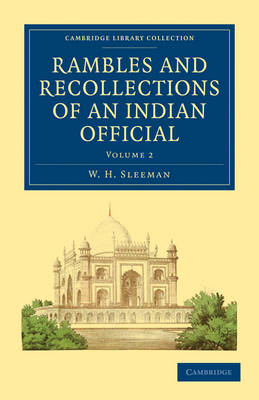
Rambles and Recollections of an Indian Official
Cambridge University Press (Verlag)
978-1-108-22895-4 (ISBN)
Lieutenant-Colonel William Henry Sleeman (1788–1856) spent his entire career in India as an army officer and later as a magistrate and resident. He was best known for his fight to suppress the activities of 'thugs', bands of criminals who attacked, robbed and often murdered innocent travellers. By the time of the publication of this two-volume work in 1844, Sleeman had lived in India for more than thirty years. In Volume 2, Sleeman examines many issues related to governance, such as land, tax, military discipline and the justice system, and he recounts some of the extensive conversations he had with Indians on these matters. His travels in this volume takes him through Gwalior, Dholpur, Agra and Bharatpur, and the book includes plates of some of the spectacular buildings that he visits.
1. Pindaree system. Character of the Mahratta administration. Causes of their dislike to the paramount power; 2. Dholepore, capital of the Jat chiefs of Gohud. Consequence of obstacles to the prosecution of robbers; 3. Influence of electricity on vegetation. Agra and its buildings; 4. Noor Jehan, the aunt of the Empress Noor Bahul, over whose remains the Taj is built; 5. Father Gregory's notion of the impediments to conversion in India. Inability of Europeans to speak Eastern languages; 6. Futtehpore Secree. The Emperor Akbar's pilgrimage. Birth of Jehangeer; 7. Bhurtpore. Deeg. Want of employment for the military and the educated classes under the Company's rule; 8. Goverdhun, the scene of Krishna's dalliance with the milkmaids; 9. Veracity; 10. Declining fertility of the soil. Popular notion of the cause; 11. Concentration of capital, and its effects; 12. Transit duties in India. Mode of collecting them; 13. Peasantry of India attached to no existing government. Want of trees in Upper India. Cause and consequence. Wells and groves; 14. Public spirit of the Hindoos. Tree cultivation, and suggestion for extending it; 15. Cities and towns, formed by public establishments, disappear as Sovereigns and Governors change their abodes; 16. Murder of Mr. Fraser, and execution of the Nowab Shumshoodeen; 17. Marriage of a Jât chief; 18. Collegiate endowment of Mahomedan tombs and mosques; 19. The old city of Delhi; 20. New Delhi, or Shah Jehanabad; 21. Indian police. Its defects, and their cause and remedy; 22. Rent-free tenures. Right of Government to resume such grants; 23. The station of Meerut. Atalees who dance and sing gratis for the benefit of the poor; 24. Subdivision of lands. Want of gradations of rank. Taxes; 25. Meerut. Anglo-Indian society; 26. Pilgrims in India; 27. The Begum Sumroo; 28. On the spirit of military discipline in the native army of India; 29. Invalid establishment.
| Erscheint lt. Verlag | 16.6.2011 |
|---|---|
| Reihe/Serie | Cambridge Library Collection - South Asian History ; Volume 2 |
| Zusatzinfo | 25 Plates, unspecified |
| Verlagsort | Cambridge |
| Sprache | englisch |
| Maße | 140 x 216 mm |
| Gewicht | 640 g |
| Themenwelt | Reisen ► Reiseberichte ► Asien |
| Geschichte ► Allgemeine Geschichte ► Neuzeit (bis 1918) | |
| Geisteswissenschaften ► Geschichte ► Regional- / Ländergeschichte | |
| ISBN-10 | 1-108-22895-X / 110822895X |
| ISBN-13 | 978-1-108-22895-4 / 9781108228954 |
| Zustand | Neuware |
| Haben Sie eine Frage zum Produkt? |
aus dem Bereich


